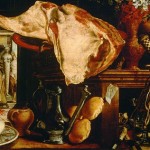 John 11:28-44
John 11:28-44
Jesus wept.
Every fan of Bible trivia knows that this is the shortest verse in the Bible (though not many could tell you it’s John 11:35). This morning, I’m going to write about 1000 words on just 2 words: “Jesus wept.”
Jesus wept. This is an extraordinary statement. Knowing with Martha that Jesus is the Messiah and the Son of God, knowing that He is fully capable of raising the dead to life, we read that Jesus wept.
Let’s try to put ourselves in Jesus’ place.
1. Lazarus is sick
2. Jesus tarries so that Lazarus can die
3. Lazarus is dead (and therefore stinketh)
4. Jesus knows that He will raise Lazarus from the dead
5. Jesus weeps
Why does Jesus weep? He knows that all who die in faith will be raised from the dead to heaven. He knows that Lazarus in particular will be raised to life in a few short minutes because He Himself will raise Lazarus from the dead.
So why does Jesus weep? Surely there is something significant about Jesus here. Jesus weeps in the first place because Mary was at His feet, weeping for her dead brother. The Jews are weeping with her also. As a result, Jesus groans in His spirit and was troubled.
Here is the Son of God, the Creator of heaven and earth, and He weeps. Knowing that this is not a sickness unto death (ultimately), He groans in His spirit. Because Mary and the Jews are weeping, He groans. He groans here, not because Lazarus is dead but for the grief of Mary and the Jews. He groans out of empathy; He groans out of love.
As Jesus travels to the grave, He now not only groans but He weeps. Jesus weeps. He weeps because His friend Lazarus is dead, but why would He do that, knowing that He will raise Lazarus to life in a few minutes? He weeps because death is always painful, especially to the Son of Man. The truth is that Lazarus was truly dead (he stinketh), and that pains Jesus.
But I think there is much more at work here. In meeting Lazarus’s death, Jesus meets His old Enemy – Death. Not just the deadness of a man who shall shortly be alive but Death itself. Here is Jesus, Who Is the Resurrection and the Life, locked in mortal combat with Death. Here is Jesus coming to grips with the Death that is the wages for the sins of the whole world. Here is Jesus, setting His face like flint toward the Cross. Here is Jesus, so sympathizing with the death of Lazarus and the death of humanity that He feels it.
Here is the God who is Love. Even the Jews see it, though they only see a human, Philadelphia love, saying, “Behold how He loved him!” It took me a minute before I could remember where I had heard this before: “Behold how He loved him!” Tertullian states that this is what the pagans often said of the early Christians: “See how these Christians love one another!”
This love from One Who Is Love is to be our love. This is why it matters that Jesus wept.
As Jesus came to the cave which was a grave, He groans within Himself for a third time. He does this after some of the people say, “Could not this Man, who opened the eyes of the blind, also have kept this man from dying?” Here is perhaps a third reason why Jesus weeps and groans: He knows the pain and suffering that is necessary to save a world of pain and suffering. He knows that though He is God, those made in His image will continue to suffer and die – until He suffers and dies for them. Even then, their sufferings and deaths will continue until the end of time and the final death of Death.
This cry of the Jews, “Could not this Man, who opened the eyes of the blind, also have kept this man from dying?” is similar to the taunts of the Jews to Jesus when on the Cross: “He saved others; Himself He cannot save.” It pains Jesus that the means by which Sin and Death will be defeated is through His own suffering and death and through the suffering and death of His disciples, as they are united to Him. “Let us also go, that we may die with Him”
After the groaning and weeping, however, Jesus raises Lazarus from the dead. He cries out with a loud voice, “Lazarus – come forth!” And Lazarus, though he is dead, obeys!
Lazarus, of course, is a picture of us. We are all Lazari: we are all dead and are ourselves the cause of suffering and death. But when the Lord who loves us weeps and groans over us, He calls us out of the grave. He calls us to die to ourselves that we might be united to Him Who Is Life.
About the stinking. Since Lazarus was truly dead, he truly began to stink, being dead four days. Now once Jesus gave him back his life, he probably stopped stinking. But I think it’s different for us. I think that we still stink because we still sin. And yet Jesus loves us and draws near to us anyway. It’s like changing a dirty diaper: the diaper doesn’t stink any less because it’s one of my own kids’ diapers, but because of my love for them I don’t seem to mind very much (except when it’s a #3!)
The love of Jesus for Lazarus is a lesson in His amazing love for us.
Let us, like Thomas, go, that we may die with Him.”
Let us, like Martha, run to meet Him whenever and however He comes.
Let us, like Lazarus, come forth and live when He calls us to new life with Him.
Prayer: Grant, O Lord, that as we are baptized into the death of thy blessed Son, our Savior Jesus Christ, so by continual mortifying our corrupt affections we may be buried with him; and that through the grave, and gate of death, we may pass to our joyful resurrection; for his merits, who died, and was buried, and rose again for us, the same thy Son Jesus Christ our Lord. Amen.
Point for Meditation:
1. Meditate on the kind of love that Jesus must have for you. Further meditate on the kind of love you are therefore required to have.
2. What must it have felt like to be Lazarus in this story? What response to Jesus do you think he would have had? What response should you have?
Resolution: I resolve to meditate on the love of Jesus for Lazarus, who is me, today.
© 2014 Fr. Charles Erlandson















